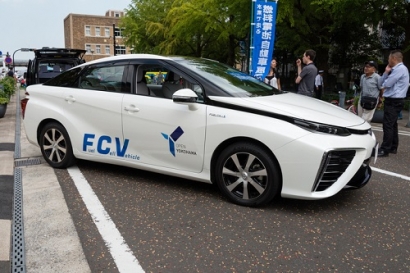
Now, the question remains, how exactly does a hydrogen engine work.Hydrogen fuel cell vehicles are propelled by a plug-in motor and thus, are labelled as e-cars. In contrast to Battery electric vehicles, hydrogen fuel cell vehicles are different in terms of electricity generation- as they tend to produce electricity all by themselves. They come up with their own effectual power plant on board, namely the fuel cell.
Also, when it is about onboard storage of energy, hydrogen has an added benefit to dole out. The fact that hydrogen is stockpiled in high-pressure tanks beneath the vehicle makes it highly beneficial to the users and the environment alike. The lightweight cisterns are cast off to lay in the high-pressure hydrogen, which cumulates a much larger volume of energy by means of hydrogen compared to lithium-ion sequences. Energy deposited in batteries needs many more battery stalls for each extra mile added to the span and scope of the vehicle. Again, in terms of energy stored in the vehicle, hydrogen clearly has the advantage, even when the fuel stall and its structure are taken into consideration.
The energy is uprooted into hydrogen fuel cell automobiles, by thrusting goaded or hounded vaporous hydrogen into the vehicle. On the other hand, battery electric vehicles are beefed up by infusing electricity into them.
Following are the advantages of hydrogen fuel cell vehicles for users-
According to Allied Market Research, the global hydrogen fuel cell vehicle market is expected to grow at a significant CAGR from 2019–2026. Surge in environmental concern worldwide has worked as the major factor driving the growth of the market. On the other hand, high initial investment in infrastructure is expected to hold up the growth to certain extent. However, top-end advancement in technology, and huge potential in the market have almost toned down the above factor and created a number of opportunities for the frontrunners in the industry.
In brief, it can be stated that hydrogen fuel cell vehicles tend to take recourse to a hydrogen fuel cell to drive its on-board electric generator. Hydrogen is used to set off a hydrogen fuel cell to produce electricity. Vehicles powered by hydrogen fuel cell hold high potential to bring down excess emissions, thereby contributing to the welfare of the environment. The fact that these vehicles never tend to emit any greenhouse gases during vehicle operation has made them a preferred choice over the gasoline as well as diesel-powered vehicles. Simultaneously, rise in government verves for modification of hydrogen fuel cell infrastructure has fueled the market growth in more than one way.

